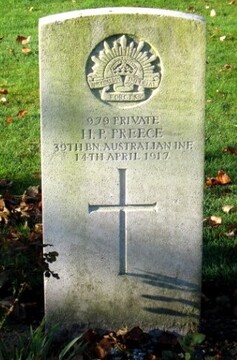
PREECE, Henry Peter
| Service Number: | 979 |
|---|---|
| Enlisted: | 6 March 1916, An original member of C Company |
| Last Rank: | Private |
| Last Unit: | 39th Infantry Battalion |
| Born: | Casterton, Victoria, Australia, 1896 |
| Home Town: | Sandford, Glenelg, Victoria |
| Schooling: | Not yet discovered |
| Occupation: | Labourer |
| Died: | Killed in action, France, 14 April 1917 |
| Cemetery: |
Cite Bonjean Military Cemetery, Armentieres Plot VI, Row A, Grave No. 5. |
| Memorials: | Australian War Memorial Roll of Honour, Casterton War Memorial, Sandford School Honour Roll, Sandford War Memorial |
World War 1 Service
| 6 Mar 1916: | Enlisted AIF WW1, Private, 979, 39th Infantry Battalion, An original member of C Company | |
|---|---|---|
| 27 May 1916: | Involvement Private, 979, 39th Infantry Battalion, --- :embarkation_roll: roll_number: '18' embarkation_place: Melbourne embarkation_ship: HMAT Ascanius embarkation_ship_number: A11 public_note: '' | |
| 27 May 1916: | Embarked Private, 979, 39th Infantry Battalion, HMAT Ascanius, Melbourne |
Help us honour Henry Peter Preece's service by contributing information, stories, and images so that they can be preserved for future generations.
Add my storyBiography contributed by Stephen Brooks
Henry was the youngest of four sons of James and Catherine Preece of Sandford, Victoria, who enlisted during WW1.
His brother 2649 Driver Thomas Andrew Preece, 1st Field Artillery Brigade AIF, was killed in action 6 October 1917. Two other brothers returned to Australia, 6879 Pte. Alfred George Preece 22nd Battalion AIF, in 1919 and 2459 Pte William Preece, 2nd Battalion AIF, in 1916.
The Casterton Free Press printed an article during June 1917, under the heading ‘Died for England's Sake.’
Our Sandford correspondent writes -Mr. James Preece; whose youngest son, Henry, made the supreme sacrifice in France about the middle of April, has received a comforting letter of condolence, expressive of the sympathy of all the officers and men in C Company, 39th Battalion with whom Henry was a general favorite. The letter is written by Captain Middleton, and he says, “That at 2 a.m. on the morning of 14th April occasion arose to send a patrol into No Man's Land, and Henry along with others; volunteered. It was a pitch-dark night, and no sound except the noise of the machine guns. Just at the time the patrol made an advance one of the others on the same patrol was hit by a stray bullet, and Henry went to his assistance, but just as he reached the wounded man a stray bullet hit him in the stomach. He lingered for a while and was bright to the last. Thus, this Regiment and this Company loses a good soldier; and thus, it is that we “who only stand and wait” realise the intensity of sorrow expressed by Kipling — “Never the lotus closes, never the wild fowl wakes; But a soul goes out on the East Wind, that died for England's sake.”









